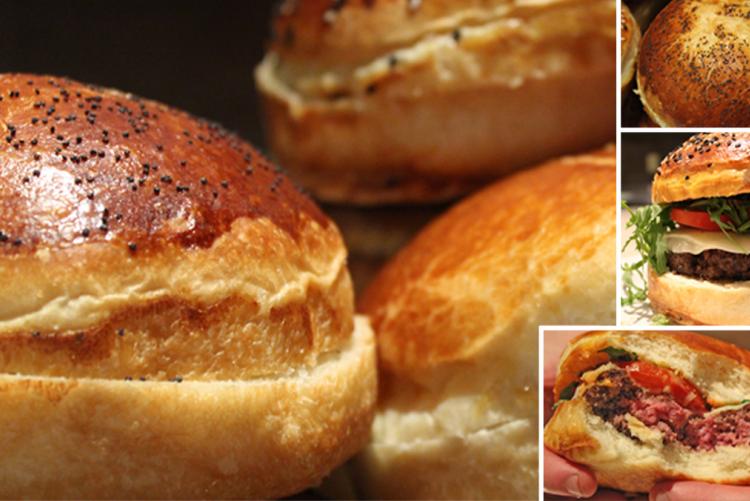
Description
If you're looking for the best brioche bun recipe ever, you've found it. I don't mean to put you off by hyperbole, but this really is an excellent, versatile bun recipe that will absolutely take your hamburger game to the next level.
This bun recipe was originally developed to fit a large, 8 oz hamburger patty. Please see the notes section at the bottom of this post for links to scalable recipes that will give you the proper yield for standard and small (slider) hamburger buns.
A special thanks to Stella Culinary community member Wartface, who helped develop and test this bun recipe. Please watch the video recipe for important notes on technique and process.
Ingredients
Instructions
- In a stand top mixer, whisk together milk and eggs until combined.
- Using a dough hook attachment, mix flour into milk and eggs, adding one large spoonful at a time, until fully incorporated.
- Once no more dry flour is visible, turn off mixer, cover mixing bowl with plastic wrap, and allow to rest for 30 minutes (autolyse).
- Mix yeast with warm water to dissolve.
- After 30 minute rest, mix in sugar, salt, and dissolved yeast using the dough hook attachment.
- Continue to mix with the dough hook, adding one pat of whole butter at a time, until the butter is fully incorporated.
- Once butter is incorporated, continue to knead with dough hook on medium speed for 15 minutes.
- Remove dough from mixing bowl and place in a plastic container that has been sprayed with non stick spray.
- Cover with plastic wrap and allow to sit at room temperature for one hour, then refrigerate overnight (anywhere from 12-16 hours).
- The following day, remove dough from fridge and scale dough into 155-160g portions.
- Flatten portioned dough on the work surface into a roughly shaped disc. Fold each edge of the disc into the center, pinching the seems together, forming a strong crease.
- Bench rest seem side down while forming the rest of the buns.
- Round dough by pressing the seem side into the table while making a rounding motion. This will give you a tight skin on the top of the bun, which will lead to better oven spring.
- Press down into a round disc, cover with plastic wrap, and allow to rest for 10 minutes.
- Press press dough disc into 4.5" metal tart rings, or tinfoil collar (see notes below).
- Cover with plastic wrap and allow to proof at room temperature for 1-2 hours, or until doubled in size.
- Once proofing is complete, brush the tops of the dough with egg yolks that have been mixed with a small splash of water. Sprinkle with your favorite toppings including sesame seeds, poppy seeds, sea salt ... or just leave plain.
- Bake in a convection oven at 375°F/190°C for 18 minutes, or until the top of the bun is a rich golden brown, and the internal temperature is between 195-200°F/90-93°C.
- Let cool at room temperature for at least an hour before slicing.
If stored in a zip-top bag, these buns will easily last for at least three days at room temperature.
Notes
SCALDING MILK
A lot of bread recipes that use milk will call for it to be scalded first (heating to a temperature of 180°F/82.2°C). This serves to deactivate the whey protein in the milk, which can weaken gluten structure, leading to a denser loaf.
However, in this formulation, we have plenty of gluten structure provided by the bread flour and autolyse, so scalding the milk is an optional step that I personally didn't find necessary. However, if you're having issues with an overly dense bun, you may want to consider scalding your milk first,
letting it drop to 100°F/37°C before using it in this recipe.
INCORPORATING BUTTER
For best results, allow your butter to come to room temperature, and incorporate it one small pat at a time. The butter will have a tendency to ride up the side of the mixing bowl. When this happens, simply stop the mixer, and hand mix the butter back into the dough using the dough hook attachment.
REFRIGERATION
Chilling the dough in the refrigerator overnight accomplishes two things. First, the slower fermentation will help to add complexity of flavor, yielding a superior brioche bun. Second, because this dough has a high fat content, it will be extremely hard to handle and form at room temperature. This is why the dough is portioned and formed as soon as it is removed from the fridge.
For added flavor and convenience, you can delay the fermentation a second time after forming. Once the individual portions of dough are placed in the tart ring/tin foil collar, you can cover with plastic wrap and place bake in your refrigerator for up to 16 hours.
When removed from the refrigerator, if the dough has already doubled in size, bake immediately as instructed above. If it has yet to double in size, leave covered at room temperature until the dough has finished proofing, and then bake.
When using this method, you may find that the yeast activates unevenly when baked directly from refrigeration, giving you certain portions of dough that rise faster than others. Best case scenario would be to pull the dough from the fridge once it's risen 1.5X its original volume, and then allow it to rise to a total of 2X its original volume at room temperature before baking. This "tempering" at room temperature will lead to a more even oven spring.
TIN FOIL COLLAR
For detailed instructions on making the tin foil baking collars used in this recipe, please see this related post.
MAKING DIFFERENT SIZED BUNS
As noted in the introduction to this recipe, these hamburger brioche buns were originally formulated for a large, 8 oz patty. But this recipe will work great for any sized bun or roll. Linked below are two recipes, one scaled for a standard, 4" hamburger bun, and one scaled for a 3" slider bun. The recipe and method are identical to this one and are posted purely for your convenience. Simply enter in the yield calculator how many buns you want to end up with, and the ingredients in the given recipe will automatically be scaled.
